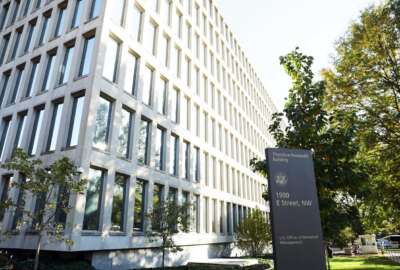The National Treasury Employees Union says it scored a victory in the ongoing legal battle over the president’s 2018 executive orders on collective bargaining, official time and employee removals.
In a collective bargaining dispute with the U.S. Patent and Trademark Office, an arbitrator determined the agency had committed unfair labor practices by implementing portions of the president’s 2018 executive orders.
Those practices, the arbitrator said, run afoul of the longstanding Federal Service Labor-Management Relations Statute.
For NTEU, which represents trademark attorneys and examiners at USPTO, the arbitrator’s decision is a definitive victory in its ongoing efforts to invalidate the president’s 2018 executive orders. To its knowledge, it’s also the first time an arbitrator has declared pieces of those EOs in violation of the law, the union said.
A federal district court had initially enjoined nine key provisions of the workforce executive orders back in 2018. But the U.S. Court of Appeals later reversed the decision last summer on jurisdictional grounds. Federal unions, the appeals court said, had a variety of administrative avenues with which to pursue individual agency complaints with the EOs, namely through the Federal Labor Relations Authority.
“The White House should know that we have a slew of these grievances pending in multiple agencies, all designed to prove, once and for all, that [President Donald Trump] can’t run roughshod over federal employees and labor law,” Tony Reardon, NTEU’s national president, said Wednesday in a statement.
Though the appeals court didn’t explicitly name arbitration as one of the administrative avenues unions could use to pursue their complaints with the EOs, the arbitrator on the NTEU-USPTO case, William Persina, determined he had the authority to weigh in on the validity of the orders — and whether the agency committed unfair labor practices when it implemented them.
NTEU raised concerns with several pieces of the 2018 workforce executive orders. It argued that, for example, the EO’s 25% cap on official time in a given fiscal year is contrary to federal labor-relations statute.
USPTO argued the labor-relations law gives it “wide latitude” to negotiate with its unions on official time, while imposing a limit on the amount of official time that any one NTEU representative can use in a given year.
But the arbitrator dismissed the agency’s rationale, arguing official time arrangements must be made through collective bargaining negotiations, not through an executive order.
USPTO’s defense of provisions in the president’s 2018 executive orders fell short with the arbitrator as well.
“The issue is whether the president can by EO undermine Congress’s s specific statutory scheme for how collective bargaining should be conducted in the federal sector,” the arbitrator’s decision reads. “This arbitrator’s answer is that he cannot. To answer otherwise would allow the president to effectively amend acts of Congress.”
The collective bargaining agreement between USPTO and NTEU dated back to 2001. It “rolled over” in a sense each year, unless either the agency or the union asked to reopen and renegotiate portions of the contract. The last “rollover term” for the contract concluded in January 2020.
USPTO told NTEU of its plans to immediately implement portions of the president’s workforce EOs in early October, shortly after the court injunction on them expired. NTEU filed three unfair labor practice complaints with the agency the following month, arguing PTO had violated labor relations law.
Again, the arbitrator’s decision fell in line with the union.
“While the agency may have believed in good faith that it was required to implement the EOs, that does not change the fact that the agency must bear the consequences of choosing to implement EOs that conflicted with agreement provisions then in effect,” the arbitrator wrote. “The agency is reasonably held to being aware of the fact that the validity of those provisions was still in question, notwithstanding the court of appeals’ dismissal of the unions’ lawsuit on jurisdictional grounds in AFGE v. Trump.”
USPTO declined to comment on the arbitrator’s recent decision.
The agency can file exceptions to the arbitrator’s decision with the FLRA, and the decision can be appealed in court.
Still, NTEU said the arbitrator’s decision on the USPTO case holds importance for unions in their ongoing effort to invalidate the president’s 2018 executive orders.
“A federal agency cannot just ignore an existing contract, skip the necessary bargaining and impose strict new limits on the union’s ability to represent employees,” Reardon said. “We think this is the beginning of an extensive but necessary process to chip away, piece by piece, at these anti-union, anti-employee executive orders, and NTEU is in it for the long haul.”
Copyright
© 2024 Federal News Network. All rights reserved. This website is not intended for users located within the European Economic Area.
